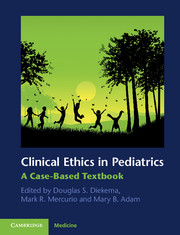Book contents
- Frontmatter
- Contents
- Contributors
- Preface
- Section 1 Core issues in clinical pediatric ethics
- Section 2 Ethical issues at the beginning of life: perinatology and neonatology
- Section 3 When a child dies: ethical issues at the end of life
- Section 4 Ethical issues posed by advances in medical technology and science
- Section 5 Children, public health, and justice
- Section 6 Special topics in pediatric ethics
- 37 Industry representatives, gift-giving, and conflicts of interest
- 38 Patient participation in medical training
- 39 Boundary issues in pediatrics
- 40 The impaired, incompetent, or unethical provider
- 41 Ethics committees and consultation services
- Index
- References
40 - The impaired, incompetent, or unethical provider
from Section 6 - Special topics in pediatric ethics
Published online by Cambridge University Press: 07 October 2011
- Frontmatter
- Contents
- Contributors
- Preface
- Section 1 Core issues in clinical pediatric ethics
- Section 2 Ethical issues at the beginning of life: perinatology and neonatology
- Section 3 When a child dies: ethical issues at the end of life
- Section 4 Ethical issues posed by advances in medical technology and science
- Section 5 Children, public health, and justice
- Section 6 Special topics in pediatric ethics
- 37 Industry representatives, gift-giving, and conflicts of interest
- 38 Patient participation in medical training
- 39 Boundary issues in pediatrics
- 40 The impaired, incompetent, or unethical provider
- 41 Ethics committees and consultation services
- Index
- References
Summary
Case narrative
A pediatric resident is seeing a 4-month-old female who is post-op from pyloric stenosis repair. The child presents with a high fever and no obvious signs of infection. Because of her post-op status, the general surgery resident is seeing the patient along with the pediatric resident in the emergency department. Both of the residents believe the child needs to have a catheterized urine specimen collected, but have been unsuccessful at performing the procedure because the child has labial adhesions. As both residents stand over the child, the surgical resident looks at the pediatric resident and says, “We need the urine sample, and there is an easy way to fix this.” He grasps the labia and pulls them apart, leaving a raw, bleeding labial surface. He then walks out of the room. When the pediatric resident asks her attending physician for advice, she is told to make no mention of the event in the chart and to say nothing to the family.
Introduction
Responding to other physicians whose behavior or clinical practice appears incompetent or unethical presents many difficult challenges. Many physicians feel some duty of loyalty to their peers. Minimally, this duty requires that physicians not take action that may harm a colleague’s career unless there is sufficient evidence to justify that action. At the same time, clinicians have an independent obligation to protect patients who may be receiving substandard care.
- Type
- Chapter
- Information
- Clinical Ethics in PediatricsA Case-Based Textbook, pp. 231 - 234Publisher: Cambridge University PressPrint publication year: 2011

